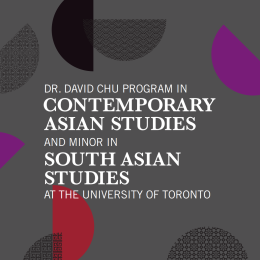Contemporary Asian Studies
Asia is home to more than half the world’s population. Its cultural and historical complexity is endless, its economic growth unprecedented, and its global influence unmatched. Our job is to understand it better.
As a student in the Dr. David Chu Program in Contemporary Asian Studies (CAS), you’ll learn from world-leading scholars of East, Southeast, and South Asia about the links between Asia’s diverse histories and cultures and the region’s evolving role in global affairs.
Our emphasis on experiential learning allows you to engage with Asia through research, travel, and collaboration. You’ll develop the foundational knowledge, skills, and connections to launch your career and build a lasting community.
Download our program brochure.
Transform your understanding of the world and your place within it
- The CAS program trains you to comprehend Asia’s roles in new global dynamics
- You’ll gain a deeper understanding of the region and localities within it, while exploring the complex webs that connect local sites to contemporary global issues
- Choose from a variety of courses that examine colonialism, modernity, youth cultures, cities, nationalism and revolution, research methodologies and more, through a pan-Asian, multidisciplinary lens
- Design and carry out your own research in Asia with opportunities like the Richard Charles Lee Insights through Asia Challenge
- Our grads have gone on to careers in every field imaginable – the pan-Asian expertise and critical perspective you gain through CAS have universal value
Visit the Arts & Science Calendar for program requirements and courses.
Special Topics Courses 2022-23
| CAS390H1F | Special Topics: Asian Digital Network Practicum | Monday 12:00 – 2:00 PM | ||
| Instructor: Dr. Dylan Clark, Lecturer, Asian Institute
Students are connected with a digital practicum placement in partnership with local, national, or international not-for-profits or governmental organizations connected to Asia. Students work in teams of 2-5 students, and help partner organizations address key issues they identify. Student teams work actively on strengthening on-line networks with partner organizations, while developing mutual mentoring, critique, and exchange with the organizations. Students are expected to invest 5-7 hours per week in course projects, in addition to class time. Students are expected to help teammates, advise other teams, and contribute their skills and talents to their community partners. The course will emphasize how groups can work together to contribute to extending, learning from, and contributing to transnational networks that bridge the University of Toronto and a range of partners throughout Asia. |
||||
| CAS390H1S | Special Topics: Asia’s Digital Futures | Tuesday 10:00 AM – 12:00 PM | ||
|
Instructor: Irene Poetranto, Senior Researcher, Citizen Lab, and Doctoral Candidate, Political Science This course is designed for senior undergraduate students who wish to enhance their knowledge of Asia’s adoption of the Internet and digital tools, and how these tools and systems are reshaping Asian societies, including their politics, culture, and social movements. We will study how governments in the region regulate information flows online and experiment on new technologies that have the potential to either curtail or encourage public participation. This course will also examine the private sector’s outsized role in our digital economy and its consequences for human rights and good governance. Finally, we will shed light on the role of the Internet as a site of contestation, where representation, dissent, and resistance are developed and negotiated. By the end of the course, students will be able to identify and distinguish the range of actors, institutions, and policies that constitute our global network society, and understand Asia’s impact on the future of technology. There are no exams in this course. Coursework required includes a quiz, a presentation, discussion board posts, essays, and class participation. Assignments in the course are designed to help students develop critical thinking and public speaking skills, and learn how to write to different audiences. |
||||
| CAS490H1F | Special Topics: Politics of China and Democracy in Asia | Tuesday 10:00 AM – 12:00 PM | ||
| Instructor: Professor Lynette Ong
This joint undergrad/grad seminar is designed to provide students with an understanding of the underlying forces driving the political landscape in China and other Asian countries. We begin with the question why China has defied the modernization theory with the persistence of authoritarian regime. What are the nature of political institutions and state-society relations that explain this persistent outcome in China? We then examine the polities of South Korea, Taiwan and emerging Asian democracies to study the underlying patterns of state and societal forces that led to regime changes. This course seeks to understand the similarities and explain the differences of the hodgepodge of autocratic and democratic regimes in Asia, and ask “why” and “why not”. Students should be prepared to read course materials and engage in class discussion. |
||||
| CAS490H1S | Special Topics: Comparative Regional Studies of China’s Belt and Road Initiative | Thursday 2:00-4:00 PM | ||
|
Instructor: Dr. Stephen Smith, PhD, Postdoctoral Fellow, University of Toronto This course considers how China’s enormous Belt and Road Initiative (BRI) has generated cultural, political, social, and economic transformations across Asian and Eurasian contexts. The course is open to senior undergraduate and early graduate students from the Center for European, Russian, and Eurasian Studies and the Asian Institute, as well as the Master of Global Affairs program. Focusing on China, Central Asia, and Southeast Asia, we will explore specific cases of geopolitics, geoeconomics and geoculture along the Digital, Green, and Health Silk Roads, looking at everything from surveillance in smart cities, to debt trap diplomacy, to the future of democracy in a China-centric world. |
||||
Asian languages
While the Asian Institute does not sponsor any language courses at the University of Toronto, students in CAS who do not have an existing background in an Asian language are strongly encouraged to take at least one year of an Asian language. On St. George campus, the Department of East Asian Studies offers courses in Chinese, Korean, and Japanese. Alternatively, UTM and UTSC offer courses in Asian languages including Chinese, Japanese, Hindi, Sanskrit, and Tamil.
The Asian Institute Advantage
As a boutique program situated in the Asian Institute at the Munk School of Global Affairs and Public Policy, CAS offers students a host of unique resources. Find out more on our student resources page.
Experiential learning
- Travel to Asia for language study, courses, and research
- Conduct fieldwork with Asian-Canadian communities in Toronto through CAS450H: Asian Pathways Research Practicum
- Guided independent research and funding opportunities including the Richard Charles Lee Insights through Asia Challenge (ITAC)
Scholarships and Awards
- Dr. David Chu Scholarships in Asia-Pacific Studies offer funding for students to study and conduct research in Asia
- A range of scholarships and awards to fund student travel and research, and recognize leadership and academic excellence
Career Development
- Gain the skills and knowledge for careers in a world that is no longer rooted in the West
- Prepare for work in academic research, policy development and practice, global business and more
- Global Careers through Asia Conference
- Connect with alumni for networking and professional development through our Alumni Mentorship Program (AIM)
Student Groups
- Contemporary Asian Studies Student Union (CASSU)
- Synergy: The Journal of Contemporary Asian Studies
Contact US
We want to hear from you! To learn more or get your questions answered, contact:
Katherine MacIvor
Program Advisor and Communications Officer
Asian Institute at the Munk School of Global Affairs and Public Policy
1 Devonshire Place, room 228N
ai.asianstudies@utoronto.ca | 416-946-8832


